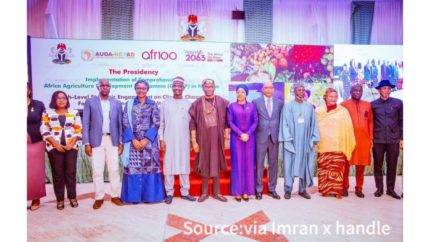Rt. Benjamin Kalu, the Deputy Speaker of Nigeria’s House of Representatives, has outlined key strategies to combat the nation’s food crisis and transform its agricultural sector into a driver of economic growth. Speaking at the Implementation of Comprehensive Africa Agriculture Development Programme (CADAP) in Abuja, Kalu stressed the importance of addressing climate change, enhancing food systems, and mobilizing resources effectively to achieve food security and environmental sustainability.
Rt. Benjamin Kalu Addressing Food Security Challenges
Benjamin Kalu highlighted the urgency of addressing Nigeria’s food security challenges, emphasizing the need for robust food systems and efficient resource mobilization. He acknowledged the obstacles facing the nation but remained optimistic about overcoming them through collaborative efforts. By prioritizing climate change mitigation strategies and implementing sustainable agricultural practices, Benjamin Kalu proposed a pathway towards ensuring food security for Nigeria’s growing population.
Benjamin Kalu’s insights underscored the critical juncture at which Nigeria finds itself, where proactive measures are essential to safeguarding the nation’s food supply and agricultural capabilities. His call for collaborative action resonates with stakeholders across various sectors, emphasizing the interconnectedness of efforts required to address complex challenges such as food insecurity and environmental sustainability.
As Nigeria grapples with its food crisis and seeks to leverage its agricultural sector for economic development, the insights provided by Deputy Speaker Rt. Benjamin Kalu serve as a roadmap for action. By prioritizing the establishment of sturdy food systems, efficient resource mobilization, and climate change mitigation, Nigeria can navigate its current challenges and emerge as a beacon of food security and environmental sustainability in the region. Benjamin Kalu’s vision for a resilient agricultural sector underscores the importance of collective action and strategic planning in building a prosperous and sustainable future for Nigeria.
Nigeria’s Agricultural Sector at a Crossroads
At a recent gathering, the Deputy Speaker Rt. Benjamin Kalu of Nigeria highlighted the critical state of the nation’s food security and agricultural capabilities. While acknowledging the formidable challenges facing farmers, including limited access to modern tools, financing, and deteriorating infrastructure, he remained optimistic about overcoming these obstacles through collaborative efforts. Initiatives like the Comprehensive Africa Agriculture Development Programme (CAADP) were cited as beacons of hope, offering the potential to empower farmers with necessary resources and market connections.
The Deputy Speaker emphasized the importance of collective action, stressing the need for collaboration between government, businesses, and communities to create an enabling environment for private investment. Innovative financing mechanisms such as blended finance and crowdfunding were proposed to unlock dormant potential in the agricultural sector. Furthermore, proactive measures to address climate change, such as the adoption of drought-resistant crops and sustainable land management practices, were deemed essential for ensuring long-term food security in the face of environmental challenges.
Investment in critical areas such as food storage facilities and processing infrastructure was highlighted as imperative for reducing post-harvest losses, creating employment opportunities, and stimulating economic growth. The Deputy Speaker outlined ambitious goals, including a 25% increase in food production within the next five years, the creation of 10 million new jobs in the agricultural sector by 2030, and a 50% reduction in post-harvest losses. Additionally, achieving net-zero emissions in the agricultural sector by 2050 was identified as a key objective.
PISE-P Launches “Food for Peace” Initiative
In response to the urgent need to address food insecurity, the Programme for Integrated Social and Economic-Peace Promotion (PISE-P) has launched the “Food for Peace” initiative. This program aims to provide immediate assistance to individuals within communities by distributing food items. However, the initiative’s long-term objective extends beyond short-term relief, focusing on achieving food self-sufficiency through agricultural development.
Speaking on behalf of PISE-P, Kalu underscored the importance of ensuring food security to prevent social unrest, highlighting the principle that hunger often leads to heightened irritability among individuals. The “Food for Peace” initiative represents a proactive approach to addressing immediate needs while laying the groundwork for sustainable agricultural practices that can bolster food production and security in the region. By prioritizing the agricultural aspect of the initiative, PISE-P aims to empower local communities to become self-reliant and resilient in the face of food insecurity challenges.
Table of Contents
Discover more from OGM News NG
Subscribe to get the latest posts sent to your email.













